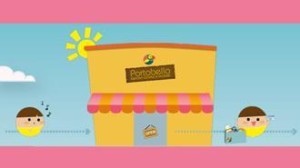 Modena — where milk costs one point and olive oil four points instead of nine euros, where you can buy food even if you don’t have the money to do so — seems possible only here, between the Torre della Ghirlandina (the bell tower of the Cathedral of Modena) and the poplars of the poor South. If you want, you can also work here, but in the same way you buy food — for free — because there in no place for money in this community enterprise.
Modena — where milk costs one point and olive oil four points instead of nine euros, where you can buy food even if you don’t have the money to do so — seems possible only here, between the Torre della Ghirlandina (the bell tower of the Cathedral of Modena) and the poplars of the poor South. If you want, you can also work here, but in the same way you buy food — for free — because there in no place for money in this community enterprise.The store might not be very striking at first, though it is cheerful and colorful, but the shelves are full: six eggs are worth one-and-a-half points, 250 grams of coffee two points, a brioche is also two points. But don’t use a single penny to buy any of it. Social services officials select the consumers — mostly victims of one crisis or another, people left homeless by the earthquakes or just struggling to survive because of a job loss or other economic setbacks. Luigi Zironi, who is in charge of the store, explains the concept while walking between aisles that are undergoing final preparation for opening day. The store is mostly dedicated to families. Indeed, the first clients are 30 families selected among those with mobility problems, expired unemployment insurance, and the self-employed who have lost at least 30% of their income. The goods are accessed by point value, not set according to their financial value, but rather based on their necessity. Zironi says Portobello aims to help the “grey zone of society,” the ones who have not lost everything yet but who know it could happen at any moment. The system works this way: Each family gets a card with a certain number of points per month. Social Services officials in Modena decide who can access Portobello based on specific criteria. The number of points granted is proportional to the number of people in the family. Families are granted six months of free groceries, though, depending on circumstances, that time limit can be extended.
Cookie cash. In addition to the size of the family, points are allotted based on the difficulty of each family’s economic situation. Unemployment is almost universally regarded by those affected as a humiliation, so the store aims to give everyone a chance to make himself or herself useful. Each beneficiary has an interview with the Voluntary Service to understand his or her work interest and to figure out a possible volunteer placement at the store. Angelo Morselli, president of the Central Voluntary Service, says the [their] goal is “to reach 100 families within a few months, and then 400, if not 1,500.” There seems to be full buy-in on the project, Morselli adds: the local political leaders, public institutions, private companies, cooperatives and individuals. Many have offered their time and money. “Modena’s community helps itself,” he says. Zironi estimates that there are 130 volunteers in the store, a number that continues to rise because most of the families they help want to give back in some way. As the retired electrical engineer, Antonio P., has: “I started giving advice because I had nothing else to do. Then I ended up diving in,” he says, pointing out the electrical system that he spent four months installing. There is also Alessandra, who lost her job. “My husband was already working as a volunteer,” she says. “I told him, ’I’m coming with you.’ They took me to a Portobello meeting, and I liked it. I like the fact that it is designed to these new types of people — victims of the crisis, with no job and on the verge of poverty.” Indeed, this is a special place that probably could not exist just anywhere. A few days before Portobello opened, store officials discovered that the cookies were missing. Everything else had arrived — the meat, the vegetables, the one-point milk, the two-point coffee — but no cookies. So they appealed to the locals for help, and now they have a six-month reserve.
From lastampa.it
Sostieni la redazione di Notizie Cristiane con una donazione, clicca qui



























